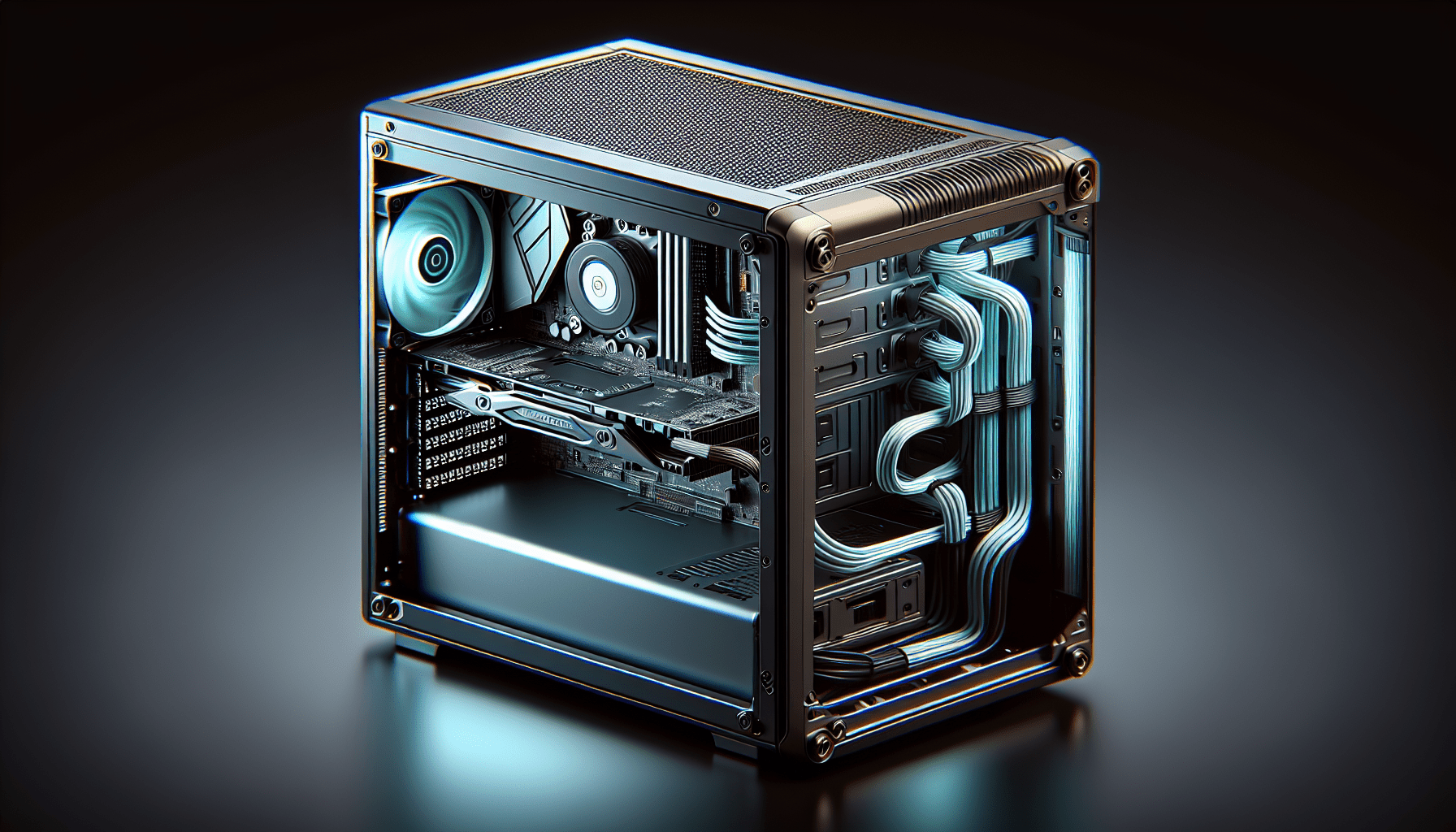When looking for a reliable small ATX case, there are several essential features that you should consider. From sufficient airflow and cable management to sturdy construction and adequate space for components, these features ensure that your case not only protects your precious hardware but also helps optimize its performance. Whether you’re a seasoned PC builder or a beginner looking to create a compact yet powerful system, understanding these essential features will guide you in making the right choice for your small ATX case.
Size
Compact design
When it comes to choosing a small ATX case, size is an important factor to consider. A compact design not only saves space on your desk or in your gaming setup, but it also allows for easy transportation if needed. A small ATX case gives you the flexibility to fit your computer components in a confined space without compromising on performance or functionality.
Ability to fit ATX components
Despite its small size, a reliable small ATX case should have the ability to accommodate all necessary ATX components. This includes the motherboard, graphics card, power supply, and storage devices. Ensuring that your chosen case can fit all these components is vital to a successful build, as it ensures compatibility and efficient use of space. Look for a case that offers sufficient room for expansion and versatility in component placement.
Build Materials
Robust construction
A reliable small ATX case should be made from sturdy and durable materials. This ensures that your components are well-protected and that your case can withstand the rigors of daily use. Look for cases made from high-quality materials such as steel or aluminum, as these materials offer excellent strength and durability.
Durable materials
In addition to robust construction, it’s important to consider the durability of the materials used in the small ATX case. The case should be able to withstand regular wear and tear, preventing any damage to your components. Look for features like reinforced corners or additional support to ensure that your case can handle the demands of a small form factor build.
Cooling System
Sufficient airflow
A reliable small ATX case should have a well-designed cooling system that provides sufficient airflow to keep your components cool. Proper airflow is essential for the longevity and performance of your PC, as it prevents overheating and potential damage to your hardware. Look for cases with strategically placed vents or mesh panels to allow airflow throughout the case.
Space for multiple fans
To further enhance the cooling capabilities of your small ATX case, it should have ample space to accommodate multiple fans. This allows you to optimize airflow by placing fans in strategic locations to effectively cool your components. Look for cases that offer multiple fan mounting points and support for various fan sizes to ensure the best cooling performance.
Compatibility with liquid cooling
Liquid cooling has become increasingly popular, even in small form factor builds. Therefore, it’s important to choose a small ATX case that is compatible with liquid cooling solutions. Look for cases with sufficient space to mount a radiator and support for water cooling components, such as tubing and reservoirs. Liquid cooling can provide superior cooling performance, especially in compact builds, so having this compatibility is a valuable feature.
Cable Management
Adequate space for routing cables
Good cable management is crucial for both the aesthetics and functionality of your small ATX case. A reliable case should provide adequate space for routing cables, ensuring they are neatly organized and out of the way. Look for cases with dedicated cable management channels or routing holes to keep your cables tidy and minimize clutter in your build.
Cable management options
In addition to space for routing cables, a small ATX case should also offer various cable management options. This can include features like Velcro straps, cable ties, or cable management clips to help secure and organize your cables effectively. Having these options makes it easier to achieve a clean and organized build, while also improving airflow and accessibility within the case.
Expansion Slots
Sufficient number of expansion slots
Expansion slots are essential for upgrading or adding components to your small ATX case in the future. A reliable case should provide a sufficient number of expansion slots to accommodate your needs. Whether you’re looking to install additional graphics cards, sound cards, or other peripherals, having enough expansion slots ensures that you won’t be limited in your future upgrade options.
Easy access to slots
In addition to the number of expansion slots, it’s important to consider the ease of access to these slots. A small ATX case should have a design that allows for easy installation and removal of expansion cards. Look for cases with tool-less mechanisms or easily accessible slots, as this will save you time and effort when adding or removing components.
Dust Filters
Presence of dust filters
Dust can be a major issue for any PC, and a small ATX case is no exception. A reliable case should have dust filters installed to prevent dust and debris from entering the case and clogging up your components. Dust filters help maintain a cleaner environment inside the case, reducing the risk of overheating and extending the lifespan of your hardware.
Easy cleaning and maintenance
In addition to the presence of dust filters, a small ATX case should also have a design that allows for easy cleaning and maintenance. Look for cases with removable and washable dust filters, as this makes it much easier to clean and maintain an optimal airflow within the case. Easy maintenance ensures that your small ATX case remains reliable and performs at its best over time.
Front Panel Ports
Variety of USB ports
Front panel ports on a small ATX case are essential for easy accessibility to various devices and peripherals. A reliable case should offer a variety of USB ports, including USB 3.0 or USB-C ports. This allows for quick and convenient connection of external devices, such as USB drives, gaming controllers, or smartphones, without having to reach around the back of your PC.
Other essential ports like audio and HDMI
In addition to USB ports, a reliable small ATX case should also provide other essential ports like audio and HDMI. These ports allow for easy connection of headphones, microphones, or external displays, enhancing the versatility and functionality of your PC. Having these ports conveniently located on the front panel of your small ATX case saves you from having to constantly reach around the back of your PC to make connections.
I/O Shield
Included I/O shield for easy installation
Installing a motherboard into a small ATX case can be a delicate process, and having an included I/O shield can make it much easier. A reliable small ATX case should include an I/O shield that fits the specific motherboard form factor. The I/O shield serves as a protective barrier between the motherboard’s input/output ports and the case, preventing any accidental damage during installation. Having an included I/O shield ensures a hassle-free and straightforward installation process.
Tool-less Design
Easy assembly and maintenance without requiring tools
A small ATX case with a tool-less design is incredibly convenient for assembly and maintenance. These cases are designed to allow for easy installation and removal of components without the need for tools. Look for features like tool-less drive bays, tool-less expansion slots, or tool-less side panels. A tool-less design saves time and effort, making building and upgrading your small ATX case a breeze.
Aesthetics
Sleek and stylish design
While the functionality of a small ATX case is essential, aesthetics should not be overlooked. A reliable case should have a sleek and stylish design that complements your overall setup. Whether you prefer a minimalist design or a more eye-catching look, there is a wide range of small ATX cases available to suit your personal taste and style.
Visual appeal
In addition to a sleek design, a reliable small ATX case should have visual appeal. This includes features like tempered glass side panels, RGB lighting options, or unique color schemes. These visual elements can enhance the overall look of your PC build, turning it into a centerpiece of your gaming setup. Choosing a small ATX case that combines both functionality and visual appeal ensures that your PC not only performs well but also looks great.

